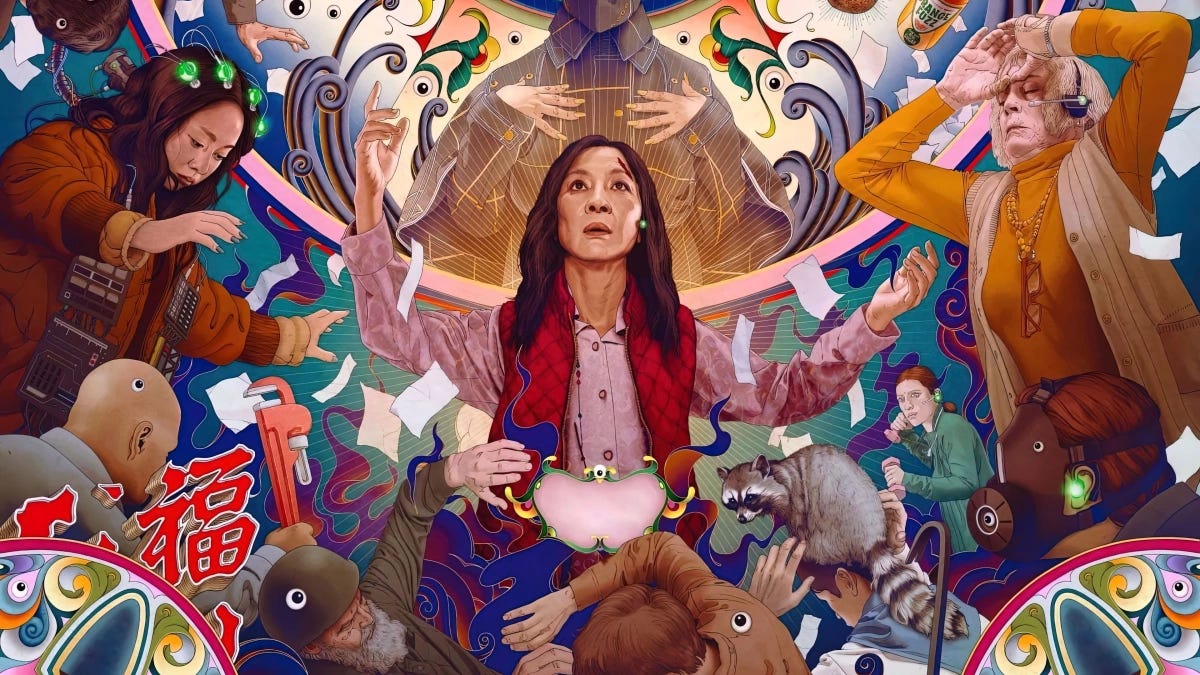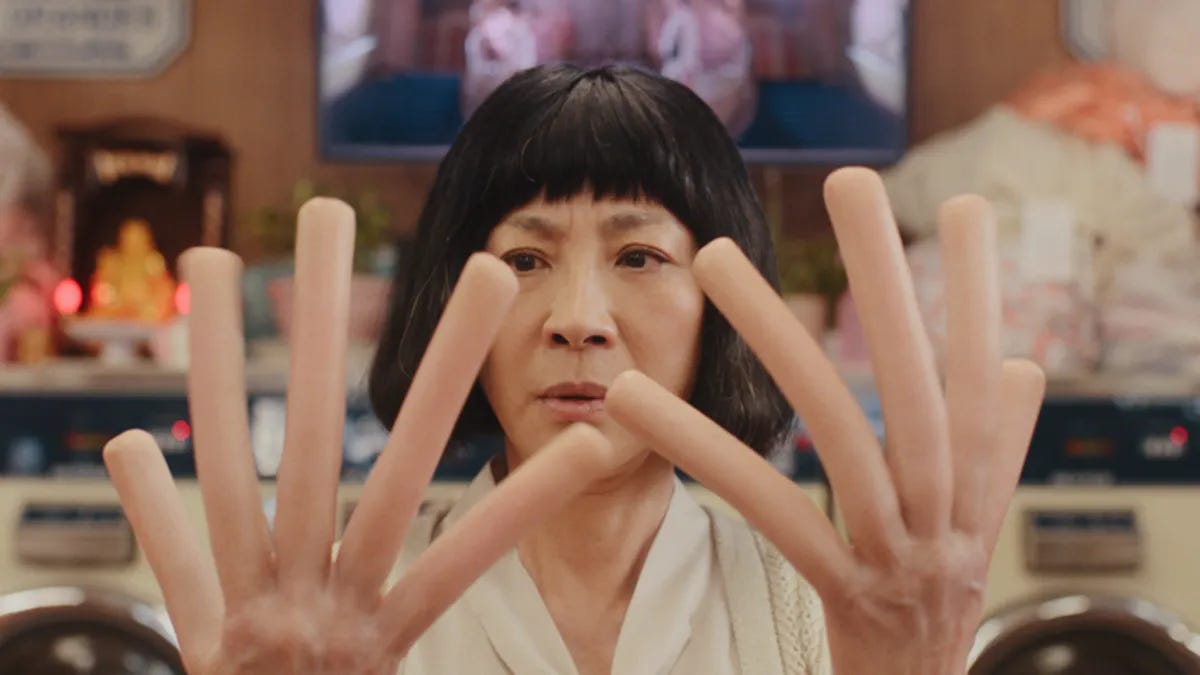Preamble
I am aware that I have managed to miss two rounds of Everything Everywhere All At Once discourse – the first following its mega-hyped release last spring, and the second surrounding its comprehensive triumph at the world’s largest professional gathering of sexual predators. But it is precisely because I have read so many half-baked takes on the topic that I now feel compelled to spew my own thoughts unto the world in the form of this article.
I will start by throwing some red meat to the zealots: I enjoyed Everything Everywhere All At Once. Where mainstream cinema becomes evermore reliant on lazy franchise sludge, it was refreshing to watch a movie packed-full of sharp dialogue and bursting with genuine emotion; a movie determined to simultaneously delight and confound its audience through every minute of its runtime.
Or, to put it more crudely, as Hollywood slides ever further into impotence, it was nice to see a movie so full of spunk.
But according to some critics, Everything Everywhere All At Once was not simply a ‘good’ movie: it was also an important one. More specifically, these critics assert that the film has something important to tell us about nihilism – broadly speaking, the notion that the universe is devoid of anything resembling ‘objective’ value.
Undeniably, Everything Everywhere All At Once did have something to tell us about nihilism, the concept around which much of its narrative revolved. But I reject the idea that it was anything particularly novel, or useful, or profound. On the contrary – and in contrast to its otherwise razor-sharp script and electric direction – I found the film’s engagement with the ‘problem’ of nihilism to be largely uninspired, and perhaps even counterproductive.
In what follows, using all of the rhetorical flair I can muster, I will do my best to explain exactly why – and hopefully you too, dear reader, will come to be similarly convinced of the film’s philosophical flaccidity.
Violent delights
First up, let us take a look at Jobu Tupaki, the film’s primary antagonist – and its living, breathing embodiment of what it means to be a nihilist1. Confronted by a universe in which anything is possible, Jobu has come to the conclusion that nothing matters at all; that “everything is just a random rearrangement of particles in a vibrating superposition.”
So, what does Ms Tupaki do with this newfound knowledge? Well, she starts killing people, of course.
In this, she follows in a long tradition of fictional nihilists – from The Joker to Anton Chigurh – who make the jump from A: believing the world has no inherent meaning to B: killing people for sport. This, I would contend, is a load of bollocks. While ‘nihilists’ might make good villains, and while ‘nihilism’ is so-often decried as a threat from all corners of the political spectrum, there is no necessary, nor compelling link between the personal conviction that life has no inherent meaning, and a desire to cause pain and suffering2.
On the contrary, human history is a long story of people butchering, and plundering, and raping, and maiming, and enslaving, other people and peoples for a cause; for something outside of, and supposedly greater than, themselves3.
Nay, if nihilists pose a threat, then it is surely not to others, but to ourselves; because if we believe that our existence lacks any inherent meaning, we lose a valuable buffer against the suffering and indignities that life can so often throw our way; because detached from a broader framework of ‘meaning’, it can be a real struggle to summon the energy and enthusiasm necessary to survive – let alone thrive – in a hypercapitalist society4.
So, by presenting nihilism as something dangerous, and the nihilist as someone with whom there is something wrong, Everything Everywhere All At Once distorts a phenomenon that is far more nuanced and complex. The conviction that ‘nothing matters’ is one that many of us live with; one that must be constantly navigated and negotiated, often at a great effort. This is not an effort that is helped by the idea that in being a nihilist, one is somehow broken, or defective, or monstrous – and so in this respect, the ‘straw nihilism’ of Jobu Tupaki is inimical to serious efforts to engage with, and ameliorate, the condition.
A new hope?
But then things get a little more interesting. For, towards the end of the movie, we learn that beneath Jobu’s murderous veneer is a scared, depressed young woman struggling to make sense of the world – and who, ultimately, wishes to no longer exist5. With this, Everything Everywhere All At Once finally has the chance to tell us something valuable – something useful – about how we might live productive, ‘meaningful’ lives in the face of the fact that nothing really matters.
But of course, it doesn’t take it.
Because in the end, the solution is simple: sure, the world might be 'meaningless', but we can counter this by finding, and forging, our own sources of meaning, like spending time with the people we love; in this, we do not have to 'disprove' nihilism, but we can move past it, by embracing the absurdity of our existence.
Hmm.
First of all, let me briefly – and rather boringly – note that none of this is new; on the contrary, this kind of 'optimistic nihilism', or Hollywood Existentialism™ – a kind of weird, homeopathic blend of thinkers like Nietzsche, Camus and Sartre – has been doing the rounds for ages6. So, to all the critics hailing the movie's unique, boundary-pushing philosophical insight, I respectfully say: nah.
But more importantly, not only is this 'solution' to the problem of nihilism an old one – it's also a bad one.
Well, let me row that back a second. Because for some people, ‘optimistic nihilism’ is indeed a great way of approaching, and living in, a world without meaning. This includes the secondary protagonist of Everything Everywhere All At Once, Waymond Wang: business owner; loving husband to an implausibly hot wife; citizen of the most affluent country on earth (and a resident of its wealthiest state). Likewise, it also seems to include the film's directors, ‘the Daniels’ – Hollywood darlings who get paid to make movies; well-to-do residents of a sun-drenched, hedonistic megacity that offers its enclave of elites a near-unparalleled quality of life.
But what of those who have never experienced love – and through no fault of their own, never will? What of those who work jobs they despise, for little reward, and with no chance of escape? What of those born, as billions are, into violence; into a world defined by strength and blood and anger – a world far, far removed from a late-night trip to the cinema to guffaw at a chef with a racoon on his head, and a lady with hot dogs for fingers?
To put it in the language of the 21st century, to be capable of being an ‘optimistic nihilist’7 is a form of privilege. To navigate a meaningless universe with optimism, implies that we have something to be optimistic about; implies – or is at least made easier by – a certain level of material and social security, a stimulating (or non-stupefying) job, and/or strong relationships with friends or family8.
But where meaning has for thousands of years been used to help us process, rationalise, and survive unending waves of misery and hardship, it is hard to imagine this kind of knowingly contingent, post-ironic worldview serving as any kind of satisfactory, functional replacement. In this case, nihilism doesn’t represent a problem because the fact that ‘nothing matters’, in and of itself, is so dark and troubling as to drive us to despair; rather, it represents a problem because by stripping the world, and our actions within it, of their supposed meaning, we rip off the cosmic sticking-plaster that previously allowed us to function in the face of an existence which is often really quite awful.
And so, while a select group of wealthy westerners might find that ‘optimistic nihilism’ floats their boat – indeed, might find that by casting aside old dogmas, they are actually able to lead more pleasurable, fulfilling lives – this is a solution for the few, not for the many. Against this backdrop, then, it is no surprise whatsoever that Everything Everywhere All At Once struck such a chord with America’s creative elite. But for the rest of us, denizens of a world that feels increasingly fucked – a world that is not simply ‘meaningless’, but whose subjective wonders are being systematically hollowed out and debased by the combined forces of technology and capitalism – to confront, and live in the face of, the idea that nothing ‘really’ matters, requires a worldview that is far more robust, and creative, and daring.
Like and subscribe
With this project, I hope to expand on, and explore, just what such a worldview might look like: because make no mistake, ‘nihilism’ as an idea, as a conviction, is not going to go away. On the contrary, it is something that is increasingly hard for many of us to deny, or evade – and while Everything Everywhere All At Once may have helped a select few individuals to re-orient themselves in the face of the abyss, this barely scratches the surface of a ‘problem’ that is far more serious than the movie suggests.
And so, if you have enjoyed, or appreciated, at least some of what I have written here, then I humbly request, dear reader, that you join me for the ride and subscribe to this newsletter. For I too, shorn of any sense of cosmic purpose, need all the encouragement I can get – and, as much as I wish it were otherwise, 'optimism' is only going to get me so far.
Yes, there was also all that stuff about the ‘everything bagel’ – but, contrary to other opinion-havers, I think that we can unpick the film's philosophical stance without any further mention of the concept. To coin a phrase: it’s really not that deep.
We can, perhaps, imagine that an individual of an already murderous or sadistic persuasion may be more likely to act on their violent impulses without an overarching moral framework to keep them in check; but in this case, such a person would already be rotten – their ‘nihilism’ would have nothing to do with a desire to harm others.
Including, but by no means limited to: religion; ‘race’; nation; the sacred; the ‘right’; the good.
Perhaps this is where I am meant to say something inspirational and uplifting; in lieu of a motivational homily, please accept this video of a BBC reporter getting mashed off his head on drugs – an eternal source of comfort in dark and uncertain times.
Again, this blunt link between ‘depression’ and ‘violence’ feels a little irresponsible; but hey, we’ll leave such discussions for the woke moralists.
See, for example, this popular video, or this ‘handbook’ – perhaps, if there is the demand, I will explore these in more detail in a future article.
Or, dare I say, an existentialist or an absurdist – however we might conceive of those terms.
This is not to say that wealth is a fast-track to philosophical and spiritual contentment; my point is that, in general, certain conditions can make it easier to believe in certain things, and live in a certain way. But to be clear; I am not suggesting for one moment that the ‘problem’ of nihilism cannot be just as acutely felt and lived by the well-off. Indeed, for those working high-status jobs that require a lot of effort, but aren’t particularly enjoyable, the conviction that ‘nothing matters’ may be particularly troubling – if such individuals cannot rationalise their labour as ‘meaningful’ or part of some kind of ‘natural order’, then why bother?





Very interesting read especially the idea of 'optimistic nihilism' as a form of privilege. Part of my falling out of love with absurdism was discovering Camus wrote it probably at his most fulfilled life -physical, romantically, financially etc. One would wonder what he would have written later in life. The problem with discourse is a need to universalise, a decent movie (very slow at the start and a pay-off that didn't quite hit for me but decent nonetheless) that hit for some must be declared as universally important. As a recovering nihilist, I'm looking forward to what you're going to write next!